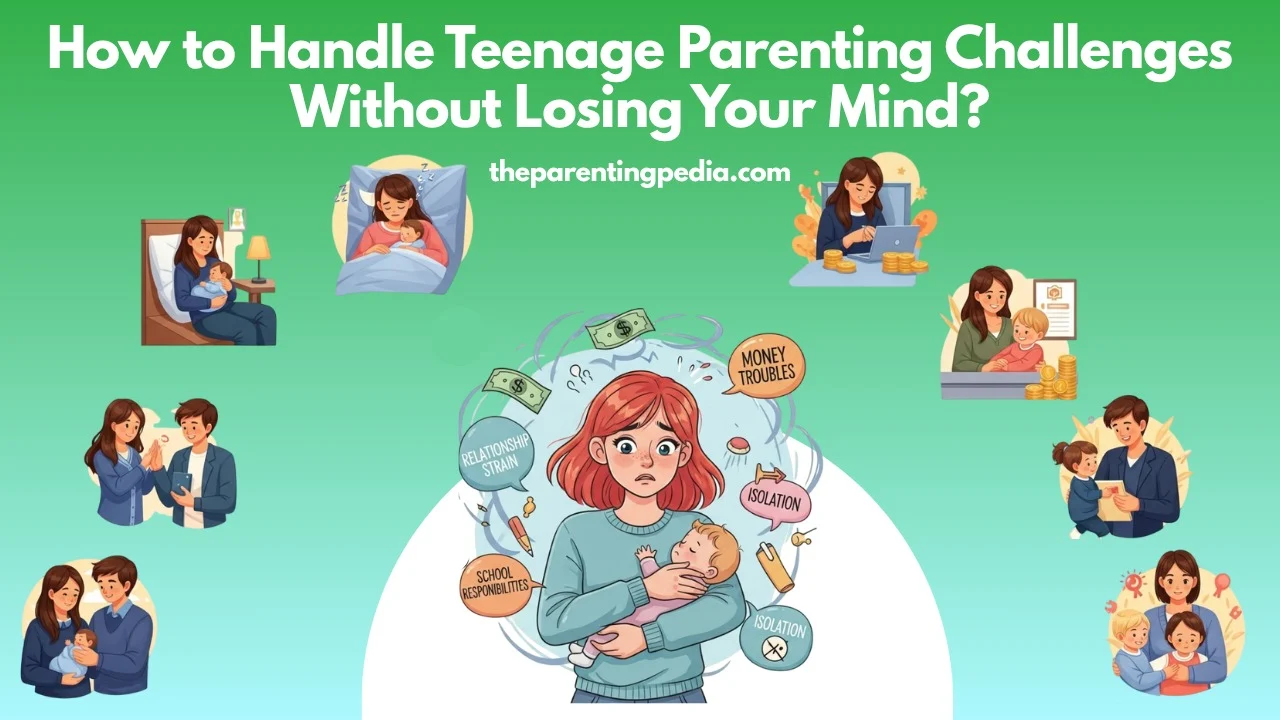Teenage parenting is one of the most rewarding but also most difficult stages of raising children. Teenagers are no longer little kids, but they are not yet adults. They are figuring out who they are, testing limits and wanting more freedom. This can lead to many challenges at home. As a parent, it can sometimes feel like you are walking on eggshells or losing your mind. But don’t worry, with patience, understanding and right strategies, teenage parenting challenges can be handled in a healthy and balanced way. In this article, we will discuss about the most common challenges parents face while raising teenagers and how to deal with them.

Teenage Parenting Challenges And Its Solutions
1. Communication Breakdown
Teenagers often stop talking openly to their parents. They may become moody, secretive or respond with one word answers. This can leave parents feeling confused and shut out.
Solution:
- Don’t force them to talk. Be patient and build an environment where your teen feels comfortable opening up.
- Talk casually during walks, while driving or over dinner.
- Avoid yelling or judging. Prioritize listening over giving advice to teenagers.
- Show interest in their hobbies, music or shows.
- Keep your tone calm and supportive while talking to them.
2. Mood Swings And Emotional Outbursts
Teenagers go through hormonal changes that affect their moods. One moment they are happy and next moment, they are angry or sad. This can feel overwhelming for both the teen and parents.
Solution:
- Stay calm when dealing with teenagers. Don’t mirror their anger.
- Give them space if needed.
- Let teenagers know it is okay to feel emotions, but guide them to express those emotions respectfully.
- Encourage teenagers to engage in activities like journaling, sports, music, or any other positive outlet.
3. Disrespect And Rule Breaking
Teenage parenting often involves dealing with rude behavior and teenagers not following rules. This is usually a way for teens to test limits or gain independence.
Solution:
- Set clear, consistent rules with reasonable consequences.
- Follow through with consequences calmly not as punishment, but as a result of their choice.
- Don’t take disrespect personally. Focus on the behavior, not the child.
- Teach respect to teenagers by modeling it. Speak to them the way you want to be spoken to.
4. Peer Pressure And Risky Behavior
Teenagers want to fit in and peer pressure is real. They may be tempted to try alcohol, smoking or other risky behaviors just to feel accepted.
Solution:
- A key part of teenage parenting is helping teens practice how to say ‘no’ in social situations.
- Talk openly about peer pressure and risky choices to teenagers.
- Become familiar with their circle of friends.
- When talking to teenagers, share real life consequences through stories that don’t sound like lectures.
- Let them know you trust them but expect responsible behavior from them.
5. Academic Pressure And Laziness
Some teens feel pressure to succeed while others may seem lazy or unmotivated. Balancing school, social life and future worries can be stressful for them.
Solution:
- Focus on effort more than results.
- Create a study routine, but allow breaks too.
- Encourage teenagers to set their own academic goals.
- Teenage parenting requires understanding that every teen is unique, so comparison to others is unhelpful.
- Don’t hesitate to communicate with teachers for guidance and help.
Also Read: Supporting Your Child’s Development With Effective Parenting
6. Addiction To Phones And Social Media
In teenage parenting, one common challenge is managing excessive phone and social media use which can harm sleep, studies and mental health.
Solution:
- Set screen time limits for teenagers.
- Encourage phone free times like during meals or before bed.
- Educate teenagers about online safety, cyberbullying and mental health.
- Parents should model healthy screen habits by limiting your own screen time.
7. Identity Crisis And Self Esteem Issues
Teens often question who they are, what they believe and how they look. Some may struggle with self-esteem, gender identity or body image issues.
Solution:
- Be supportive and non judgmental.
- Praise their efforts and qualities, not just appearance.
- Avoid teasing or negative comments about their looks.
- Let them explore their interests and identities freely within safe limits.
- If you notice signs of depression or anxiety, seek professional help early.
8. Parent-Teen Power Struggles
In teenage parenting, conflicts often arise because teenagers seek independence while parents try to maintain control, leading to power struggles.
Solution:
- In teenage parenting, focus on the most important issues like safety, health and respect and avoid getting caught up in minor conflicts.
- Involve your teen in making house rules. This gives them a sense of ownership.
- Allow small freedoms and choices in clothing, hobbies and food to avoid rebellion.
- Use “I” statements instead of directly blaming teenagers. For example, say “I feel worried when you come home late” instead of “You are always irresponsible.”
9. Feeling Like a Failure
Sometimes, no matter what you do, it may feel like your teen doesn’t listen or you are doing everything wrong. This can be emotionally exhausting.
Solution:
- Know that you are not alone. Every parent struggles.
- Take care of your own mental health. It is okay to feel frustrated.
- Join a parent support group or talk to other parents.
- Acknowledge and appreciate small victories like a meaningful talk, a thoughtful act or simply sharing a laugh.
- Parents should remember that teens grow up. This stage is temporary.
10. Balancing Love and Discipline
During teenage parenting, parents often find themselves questioning whether they are being too strict or too lenient with their teenagers. Striking the right balance can feel difficult for parents. Too much control can lead teens to rebel, hide things or distance themselves emotionally. On the other hand, too much freedom without guidance can result in poor decision-making, risky behavior or lack of responsibility. Teenage parenting requires a thoughtful mix of clear boundaries and open communication. It is important to set rules with reason for teenagers and explain their purpose. When teens feel heard and respected, they are more likely to respond positively and make better choices.
Solution:
- Be firm but kind towards teenagers.
- Set boundaries with love for them.
- Explain the “why” behind rules that you create for them.
- Allow teenagers to experience the natural outcomes of their actions when it is safe to do so.
- Stay emotionally available for them even when you disagree.

Conclusion
Teenage parenting is a journey filled with challenges, growth and important life lessons for both parents and teens. Raising a teenager is not at all easy. There will be days when parents feel exhausted, helpless or even heartbroken. But parents should always keep in mind that their love, support and patience have a greater impact than they may realize. Teens might act like they don’t care but deep down, they need parents support, guidance and unconditional love. Perfection as a parent is not required, what is needed is to be present, consistent and caring. Mistakes will be made on both sides, but what truly matters is how reconnection, repair and progress are handled.
FAQ
How to handle difficult teens?
Handling difficult teens requires patience, active listening and consistent boundaries. Stay calm during conflicts, avoid power struggles and focus on building trust. Offer guidance without judgment and allow natural consequences. Show love and support, even when correcting behavior to help them feel understood, safe and respected during their teenage phase.
What are 5 challenges of teenage parenting?
Teenage parenting comes with challenges like mood swings, defiance, peer pressure, excessive screen time and communication gaps. Teens often crave independence leading to conflicts with parents. Parents struggle to set boundaries for children while staying connected. Balancing guidance with freedom is key to helping teens grow responsibly while maintaining a healthy parent child relationship.
